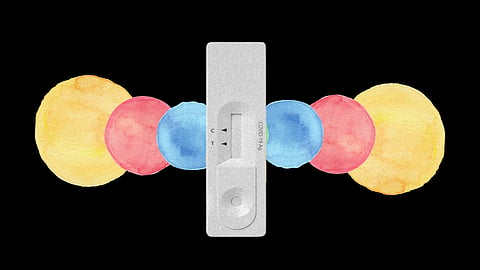

The second wave of Covid-19 has left the entire nation in a constant state of worry. What looked like almost the end of the pandemic, especially with the arrival of the vaccine; now looks like a never-ending look. Even as the virus keeps mutating and causing serious reactions such as black fungus and now the recent development of the white fungus. Along with the changing symptoms, it has become really difficult to form a concrete understanding of the disease.
However, one good news on the testing front is that we no longer need to go through the horrors of going to the hospital or call someone home to get a Covid-19 test done. Especially since tests are required for every travel, and the cost is too much to bear at all times, an at-home testing kit becomes a necessity.
Come to think of it, most of us have been waiting for this kit since last year, especially because of the trauma of exposing ourselves to many people in a testing clinic or hospital. Also, the load of testing each and every individual was burdening the already over-burdened healthcare system. Realising this, in an effort to reduce this pressure, the Indian Council of Medical Research (ICMR) has approved the use of Rapid Antigen Tests (RATs) kit at home.
The testing kit comes as a blessing as it can be used by a person who has either come in contact with a Covid-19 positive patient or by someone who is experiencing symptoms. Being a non-prescription home use kit, it is permitted for use by people above the age of 18 years and above. And for children 2 years and above with adult collecting the swab. It was also confirmed that the users of the test do not require to call a professional to collect samples, and the entire test can be taken at home.
Further, it has also been clarified by Dr Md Shakeel Ahmed, head emergency medicine, Fortis Hiranandani Hospital, Vashi, that according to ICMR, individuals who test positive using the home testing kit may be considered as true positives, and no-repeat testing is required.
Preparations before the test:
As with any other home-testing kits, there are some preparations that we need to make before testing. It is important to download the app linked to the testing kit and fill in credentials for faster results. This is also important to keep the authorities informed in case you test positive for the virus.
Now as you proceed with the test, it is important to identify a clean place to conduct the test along with a sanitised table. Following this wash your hands and dry them before you perform the test. Also, ensure that you do not touch anything else before conducting the test. Try to not let the contents of the testing kit touch any surface before and after conducting the test.
Beginning with the test
Every kit comes with an instruction manual and a biohazard bag to ensure the safe disposal of the content after testing. The test is a nasal swab test, so the person taking the test needs to take a nasal swab. After submitting the nasal swab on the stick, the results are expected to arrive in about 15 minutes.
How to know if I am positive?
Reading the test correctly is very important as it can lead to unnecessary scare. Dr Ahmed explains that the kit has a control line (C) and a test line (T) that are meant to indicate the results. “If both control line C and test line T appear in the cartridge, the presence of novel coronavirus antigen is confirmed, and the result is positive. This takes up to around 15 minutes.”
Additionally, if “only quality control line C appears, but the test line T does not appear, it indicates novel coronavirus antigen has not been detected and the result is negative”.
If the quality control line C is not observed, it will be invalid regardless of whether there is a test line T. “In this case, the test shall be conducted again.”
What to do after you have tested positive?
After a person has tested positive, the person must inform the municipal authorities about the results. They should also seek professional help in order to begin treatment for the disease.
Considering the gravity of the pandemic, it is important to keep testing so that we avoid spreading the infection to others. The testing kit is being made available at a cost of Rs. 250 so that people can avail the service and stay protected. Hence, it is important to make the most of the services being made available.
